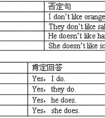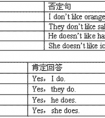阅读下面短文,用括号内所给动词的适当形式填空 (必要时可加情态动词或助动词)。Mr. Brown was going away for a week. Before he left, he said to his son, "if anyone-九年级英语
题文
| 阅读下面短文,用括号内所给动词的适当形式填空 (必要时可加情态动词或助动词)。 Mr. Brown was going away for a week. Before he left, he said to his son, "if anyone 小题1: (ask) for me, you can tell him that your father __小题2:____(be) out for doing something, and __小题3:___(come) back in a week, then be sure __小题4:___(tell) him to sit down for __小题5:_____(have) a cup of tea." "OK, Dad," said his son. But he was afraid his son couldn’t remember this, he ___小题6:____( write) these words down on a piece of paper and gave it to him. His son put it into his small pocket, took it out and looked at it every now and then. Four days passed, but no one came to see his father. The boy thought that there was no man to come and that the piece of paper was of no more use for him, so he burnt it that evening. The next afternoon, someone knocked at the door. When the door __小题7:__ (open), a man _小题8:____(stand)at the door ."Where is your father?" The man asked. The boy put his hand into his pocket at once and looked for the piece of paper. He _小题9:____(not, find )it. He suddenly remembered he had burnt it, so he shouted, "No more." The man was very surprised. He asked, "No more? I met your father last week. Please tell me when it_小题10:____( happen )?" "Burnt yesterday evening." |
答案
小题1:asks 小题2:has been 小题3:will come 小题4:to tell 小题5:having 小题6:wrote 小题7:was opened 小题8:was standing 小题9:couldn’t find 小题10:happened |
试题分析:这篇短文主要介绍了一位父亲害怕儿子忘记自己的话,给儿子写了个条,儿子烧了条,当有人来拜访时,儿子一时想起这件事,就说不在了,客人误以为是他父亲不在了。 小题1:在if引导的条件状语从句中,如果两个动作都没有发生,为了区别动作的前后关系,先发生的用一般现在时态,后发生的用一般将来时态,即主将从现。if anyone (ask) for me,是从句,不定代词作主语看做单数,故填asks 小题2:句意:你可以告诉他,你的父亲为做某事出去了,现在完成时,强调对现在的影响故填has been 小题3:in a week 一周以后,用于将来时,故填will come 小题4:一定要告诉他坐下喝杯茶,be sure to do sth ,一定要做……,故填to tell 小题5:for,介词,后加名词或动名词,故填having 小题6:他怕儿子忘记这件事,就把这写在一张纸上,过去时态,故填wrote 小题7:当门被打开是,动作的承受者作主语,用被动语态。其结构是,主语+be+done.故填was opened 小题8:当门被打开,一个人正站在门旁,强调一个动作发生时,另一个动作正在发生,故填was standing 小题9:他不能找到那张纸,过去时态,故填couldn’t find 小题10:不在了,请告诉我事情是什么时候发生的?过去时态故填happened |
据专家权威分析,试题“阅读下面短文,用括号内所给动词的适当形式填空 (必要时可加情态..”主要考查你对 实义动词,实义动词的单数第三人称形式,动词短语 等考点的理解。关于这些考点的“档案”如下:
实义动词实义动词的单数第三人称形式动词短语
考点名称:实义动词
- 实意动词:
即行为动词,表示动作的动词。实义动词与系动词是相对的,能独立用作谓语。
它分为及物动词和不及物动词两种:
及物动词是指后面要求有直接宾语的动词;
不及物动词指后面不需要跟宾语的动词。 实意动词使用方法:
及物动词
后面必须跟宾语意义才完整的实义动词,叫做及物动词(transitive verb)。如:
I believe that the committee will consider our suggestion.我相信委员会将会考虑我们的建议。
“How long can I keep the book ?”Harry asked.哈里问:“这本书我可以借多久?”
Dr. Bethune set us a good example. 白求恩大夫给我们树立了好榜样。
Crude oil contains many useful substances.原油含有许多有用的物质。
不及物动词
本身意义完整后面不须跟宾语的实义动词,叫做不及物动词(intransitive verb)。如:
Birds fly.鸟会飞。
It happened in June 1932.这件事发生于一九三二年六月。
My watch stopped.我的表停了。
She spoke at the meeting yesterday evening. 她在昨天晚上的会上发了言。
兼作及物动词和不及物动词
英语里有不少实义动词可以兼作及物动词和不及物动词。这样的动词又有两种不同的情况
a)兼作及物动词和不及物动词时,意义不变。试比较:
Shall I begin at once?我可以立刻开始吗?(begin作不及物动词)
She began working as a librarian after she left school.她毕业后当图书馆管理员。(began作及物动词)
When did they leave Chicago?他们是什么时候离开芝加哥的?(leave 作及物动词)
They left last week. 他们是上周离开的。(left 作不及物动词)
b)兼作及物动词和不及物动词时,有时意义不尽相同。如:
Wash your hands before meals.饭前要洗手。
Does this cloth wash well? 这布经得起洗吗?- 英汉实意动词用法比较:
与汉语的比较,有时英语动词的及物和不及物的用法,与汉语的用法不一样,请注意下列两种情况:
a)有的动词在英语里只能用作不及物动词,而汉语则可用作及物动词,如arrive到达,agree同意,listen听。英语里这些动词后面常接介词。如:
We arrived at the railway station at noon.
我们于中午到达火车站。(at不能省去)
(比较:We reached the railway station at noon.)
Everybody listened to the lecture with great interest.
每个人都很有兴趣地听讲课。(to不可省去)
(比较:We all heard the lecture.)
Do they agree to the plan?他们同意这个计划吗?(to不可省去)
b)有的动词在英语里能用作及物动词,而在汉语里则不能用作及物动词,如serve为…服务。
Our children are taught to serve the people wholeheartedly.
我们的儿童被教以全心全意为人民服务
用于be动词之后,实义动词之前。 实意动词的用法:
肯定句:
主语+动词过去式+其它
否定句:
主语+助动词didn‘t+动词原型+其他
一般过去式:
Did+主语+动词原型+其他
考点名称:实义动词的单数第三人称形式
在一般现在时的肯定句中,当主语为非第三人称单数时,谓语动词用原形;
当主语为第三人称单数时,谓语动词用单数第三人称形式。- 实义动词的一般现在时的单数第三人称形式遵从“s,es, ies”六字母规则。如下表所示:


![How much does it ______ to fly from Yancheng to Hainan Island?[ ]A. cost B. payC. spend D. take-七年级英语](http://www.00-edu.com/d/file/ks/4/2/shiyidongci/2020-01-05/small7dcf2f05998de63e10cc3629787031c81578210087.png)

![He always _____TV in the evening. He _____ listening to the radio. [ ]A. watch, don't like B. watches, doesn't like C. watching, don't like D. watch, do-七年级英语](http://www.00-edu.com/d/file/ks/4/2/shiyidongci/2020-01-05/small45d599b4a60b84e61cec210bfbf051f51578214524.png)
![I'd rather ___ to the Mcdonald's Restaurant because I like to listen to quiet music.[ ]A. to go B. going C. go D. went-八年级英语](http://www.00-edu.com/d/file/ks/4/2/shiyidongci/2020-01-05/small1767bba1727fef2c035c53dcbd9bc20e1578209517.png)
